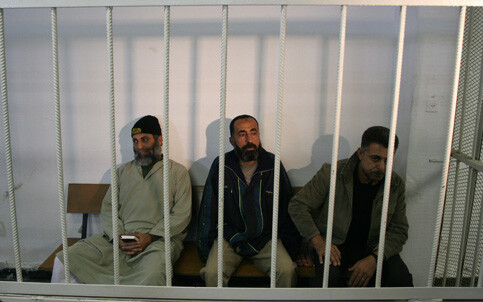The Electronic Intifada 24 December 2008

Murder suspects at a Hamas military court in Gaza City, November 2007. (Wissam Nassar/MaanImages)
RAMALLAH, occupied West Bank (IPS) - New York-based Human Rights Watch (HRW) has sent urgent letters to Palestinian leaders in the Gaza Strip and the West Bank, urging them to commute the death sentences of 11 Palestinians currently awaiting execution.
The death-row inmates, including one who was a juvenile at the time of his conviction, were sentenced this year by Palestinian military and state security courts. Two of the inmates received trials that lasted just one day.
Joe Stork, the deputy director of Human Rights Watch’s Middle East division, appealed to Gaza’s Hamas leader, and de facto Prime Minister Ismail Haniyeh, and the West Bank’s Palestinian Authority (PA) President Mahmoud Abbas to urgently review the cases.
Under Palestinian law the penalties have to be either ratified or commuted by the PA president before they can be carried out.
“It’s deeply disturbing that Palestinian courts have resumed issuing death sentences at a time when the rest of world is moving toward abolishing capital punishment,” said Stork.
“President Abbas should make clear that he will commute all of these sentences when they arrive on his desk. Palestinian officials should announce an immediate moratorium on the death penalty and eliminate its use in Palestinian law.”
In separate letters to the Palestinian leaders, HRW also expressed concern about one of the defendants, Said Jameel Zuhod, who was 17 when he together with three adults was found guilty of murdering and raping a child in Gaza in 2003.
In 2004 a Palestinian lower court sentenced Zuhod to life imprisonment on grounds of his youth. However, the Gaza Court of Appeals overturned this in 2005 and sentenced him to death. The sentence was upheld by the Gaza Court of Cassation in October this year.
HRW argued that if Zuhod’s execution goes ahead, the Palestinian territories will join the notorious club of Saudi Arabia, Sudan, Pakistan, Iran and Yemen in being the only governments to have executed juvenile offenders since 2005. Iran is the only country to have executed juveniles since 2007.
International human rights law prohibits the death penalty for all crimes committed by persons under age 18 at the time of the offense. Furthermore, the International Covenant on Civil and Political Rights (ICCPR) puts stringent restrictions on when the death penalty can be used in cases involving adults.
The Palestinian Penal Code allows courts in the West Bank to impose the death penalty for 17 separate offenses. In the Gaza Strip, 15 offenses are subject to the death penalty.
According to the Gaza-based Palestinian Centre for Human Rights (PCHR), Palestinian law justifying the death sentence is based on the Jordanian Penal Code which applies to the West Bank and the Egyptian Penal Code which applies to Gaza. This followed the two countries’ occupation of the two respective territories following the 1967 Arab-Israeli war.
In addition to these two laws the application of the death penalty was reinforced by the Revolutionary Penal Law of the Palestine Liberation Organization (PLO) of 1979.
However, the Palestinian Legislative Council has not ratified this law, especially as it relates to Palestinians accused of collaborating with Israel.
Many Palestinians who were sentenced to death by Palestinian courts or those who were arbitrarily executed, vigilante-style, by members of the resistance organizations were accused of treason by collaborating with Israeli death squads.
Despite the harsh attitude towards those accused of treason, the Angus Reid Global Monitor carried out a survey several years ago and found two-thirds of Palestinians reject the use of capital punishment.
The last time a Palestinian court sentenced someone to death or carried out an execution was in 2005. From 1994 to 2005 the PA issued 74 death sentences, some of which were commuted.
Israeli rights group B’Tselem says that Palestinian military and state security courts, which pass many of the sentences, do not meet international standards of fairness before an independent and impartial court, in addition to violating human rights.
The courts are further accused of carrying out summary trials while the accused are denied access to effective legal counsel.
The late PA President Yasser Arafat issued a presidential decree which established the state security courts without determining their mandates or the nature of the cases to be considered.
In 2001, in an attempt to partially overcome fierce international criticism for the application of the death penalty under its jurisdiction, the PA passed the Penal Procedures Law of 2001.
This enabled a condemned person to appeal the death sentence within 15 days of being sentenced. If this was rejected by the appeal court, the case would be referred to the PA president.
However, this new law didn’t preclude previous state security court death sentences, without the right to appeal, being carried out.
The World Coalition Against the Death Penalty (WCADP) stated that Abbas followed the new law with a decree issued in 2005 requesting all death sentences before the notorious state security courts be re-tried before civilian courts. However, WCADP notes that this decree has not been followed through and that death sentences continue to be declared in “conditions that contravene both international standards and Palestinian national legislation.”
The Palestinian territories do not constitute a sovereign state and neither Palestinian leadership are signatories to international human rights treaties. However, HRW points out that both Hamas and the PA committed themselves to upholding international law in regard to human rights.
All rights reserved, IPS - Inter Press Service (2008). Total or partial publication, retransmission or sale forbidden.
Related Links
- Rights org: Abbas, overturn death penalty, PCHR (18 December 2008)




